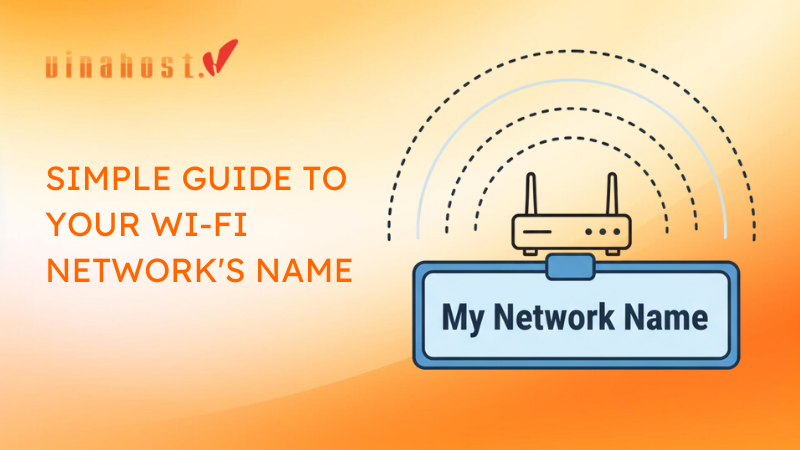Whether you’re a seasoned web professional or just dipping your toes into the vast ocean of the internet, understanding the concept of parked domains is a fundamental step in navigating the digital landscape. In this post: “What is a Parked Domain: What You Need to Know“, VinaHost will shed light on its workings, unveil its potential for profit and brand protection, and equip you with the knowledge to navigate this sometimes-murky digital terrain, ensuring your domain name blossoms into a valuable asset.
1. Understanding Domain Parking
1.1. What is a Parked domain?
A parked domain is like a placeholder in the vast landscape of the internet. Imagine you reserve a piece of land but haven’t built anything on it yet. Similarly, a parked domain is registered with a domain registrar but doesn’t have a website or any content associated with it. It just sits there, waiting for someone to develop a website or link it to an existing one. It’s a bit like a digital real estate investment!
1.2. Purpose of parking domains
A parked domain can be used for a variety of purposes, depending on your needs and goals. Here are some of the most common uses:
Reserving a name for later use
This is the most common reason people park domains. Imagine you have a great idea for a business or website, but you’re not quite ready to launch it yet. You can park the domain name to secure it for the future and prevent anyone else from claiming it.
Protecting your brand
Companies often park variations of their existing domain names, such as with different extensions (.com, .net, etc.) or common misspellings. This prevents competitors or cybersquatters from using these variations to create confusing or misleading websites.
Monetization through ads
Some people park domains and display advertisements on them to generate revenue from type-in traffic (visitors who type the domain name directly into their browser). This can be a way to earn a small income from a domain that’s not yet being used for a website.
Redirecting visitors to another website
You can park a domain and set it up to redirect visitors to another website, such as your social media page or a different website you own. This can be useful if you have multiple related websites or want to consolidate your online presence.
Creating temporary landing pages
Domain parked can be used to create temporary landing pages for marketing campaigns or other purposes. This allows you to quickly set up a page with specific information or offers without having to develop a full website.
Testing website designs or domain names
You can use them to test different website designs or domain names before launching your main website. This can be a helpful way to get feedback from users and make sure your website is as effective as possible.

1.3. Different types of parked domains
While there’s no formal classification of parked domains, they’re often categorized based on their primary purpose or how they’re monetized. Here are the common types you’ll encounter:
Non-Monetized parked domains:
- Placeholder page: Displays a simple message indicating the domain is parked, often with a “Coming Soon” or “Under Construction” notice.
- Redirect domain: Automatically forwards visitors to another website, often used for brand protection or consolidating multiple domains.
Monetized parked domains:
- Advertising page: Displays ads or links to generate revenue from type-in traffic.
- For sale page: Advertises the domain for sale, often with a price and contact information.
- Expired domain: Previously active domain that has expired and is now parked, often available for purchase.
Domain parking services:
- Third-party services: Manage and monetize parked domains, offering features like advertising, analytics, and domain sales.
Domain registrar parking:
- Parking option: Provided by domain registrars, allowing you to park domains directly in your account.
Key considerations:
- Purpose: Choose the parking type that aligns with your goals (e.g., reserving a name, generating revenue, protecting a brand).
- Monetization: Decide if you want to earn income from your parked domain through advertising or sales.
- Management: Consider using a domain parking service for convenient management and additional features.
Also Read: What is Domain & How It Impacts Your Online Presence
2. How to Park a Domain?
2.1. Registration and acquisition of a parked domain
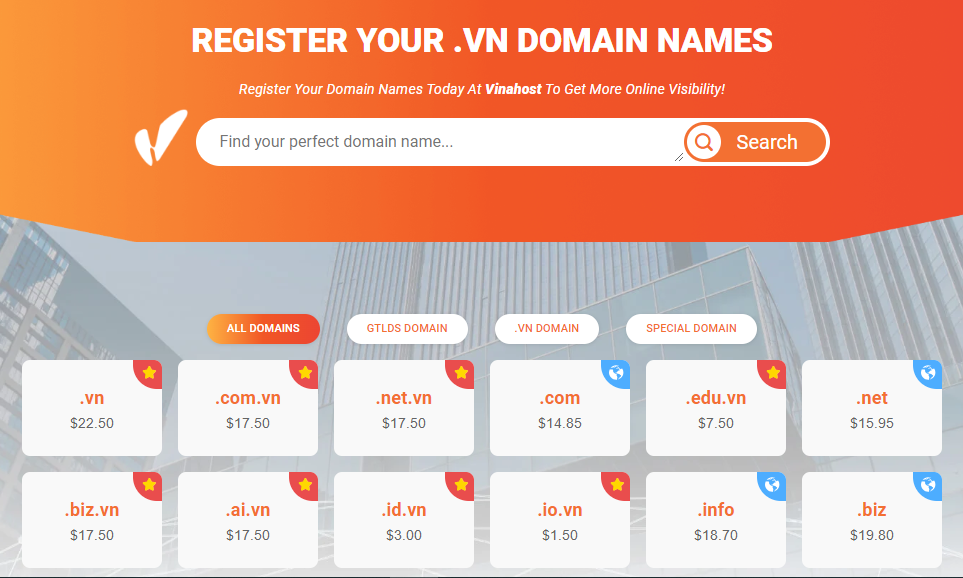
- Start by registering a domain name through domain registrar VinaHost. Choose a domain name that you think has value or that you might want to develop in the future. Follow this guideline to resigter a domain at VinaHost https://vinahost.vn/en/ten-mien-vn/.
- Once registered, you can choose to keep it parked by not associating it with any specific website or content. This is typically done through the VinaHost’s control panel.
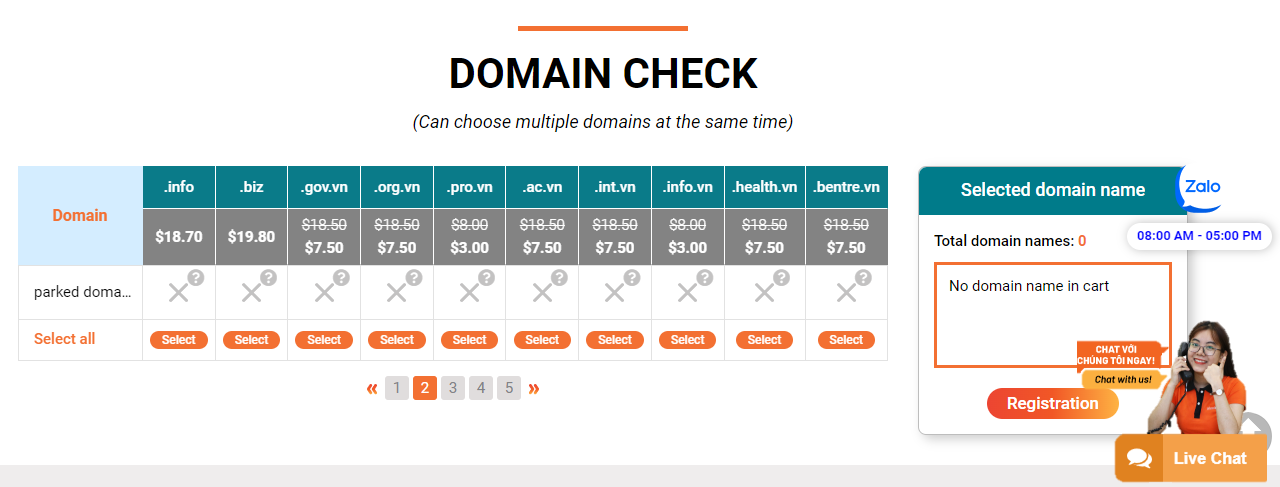
You can buy and register a domain name for as low as $1.50. These are the prices for VinaHost’s most popular TLDs:
- .com – $14.85/yearly
- .net – $15.95/yearly
- .co – $32.18/yearly
2.2. Domain parking providers and platforms
Parking a domain name via a server provider is a good option for you in the following cases:
- You already have an account with ahosting vendor.
- You plan to start a business in the future and want to park a domain while you set up the site.
With a hosting provider like VinaHost, you can get a domain name and a hosting plan in the same package.
With some cPanel hosting interfaces, you can check the number of add-on domains, sub-domains, and aliases domains that can be added to your account:
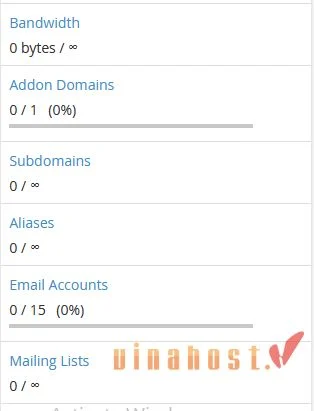
As an example for the hosting account we are about to do, you can add 1 add-on domain, unlimited number of sub-domains and domain aliases.
Guide to configure Parked Domain with cPanel:
- We have the main domain name vinahost.vn. From here, we can create another parked domain named lab.com.
- When accessing the address vinahost.vn or lab.com, we will receive the same content.
- First, you need to log in to cPanel through your account in the Client Area (https://secure.vinahost.vn/ac/index.php) –> Control Panel –> Hosting package
- To create an Addon Domain, click on “Manage domains” and select “Parked domain”.
- Proceed to create Parked domain –> Click Create
- Example image of creating parked domain lab.com for main domain name vinahost.vn
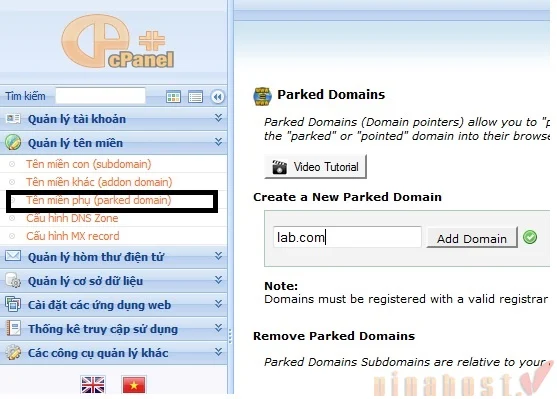
We have created the parked domain lab.com with the domain name vinahost.vn on the same hosting account.
2.3. Domain monetization strategies
If your goal is to monetize a parked domain, consider the following strategies:
- Use domain parking services: Sign up with domain parking services that display targeted ads on your parked domain. When visitors click on these ads, you will earn a share of the ad revenue.
- Affiliate marketing: You can also incorporate affiliate marketing on your parked domain. Promote products or services related to the domain’s theme and earn commissions for sales or leads generated through your affiliate links.
- Sell the domain: If the domain has potential value, you might choose to sell it to someone interested in developing a website on that domain.
3. The Anatomy of a Parked Domain
3.1. Placeholder content and landing pages
When a domain is parked, it typically displays a placeholder page provided by the domain registrar or parking service. This page serves as a temporary landing spot for visitors and may include generic content.
The placeholder page often contains information like “This domain is parked,” and it may suggest that the domain is under construction or awaiting development.
3.2. Domain advertisements and revenue generation
Some parked domains are monetized through domain parking services or advertising networks. These services display targeted advertisements on the parked domain.
When visitors click on these ads, the domain owner earns a share of the revenue generated from those clicks. This is a common strategy for generating income from parked domains without developing them into full-fledged websites.
3.3. Customization options for parked domains
Domain owners usually have some level of customization options for their parked domains. These may include:
- Branding: Adding a custom logo or branding elements to the placeholder page.
- Contact Information: Providing contact details for the domain owner or information on how to inquire about the domain.
- Redirects: Setting up redirects to direct visitors to another website or specific web page.
Customization options can vary depending on the domain registrar or parking service used. Some platforms offer more extensive customization features, allowing domain owners to create a more personalized experience for visitors.
Understanding these elements helps domain owners make strategic decisions about how to manage and potentially monetize their parked domains.
Also Read: What is a Subdomain? Exploring the Difference Between Domains & Subdomains
4. Pros and Cons of Parked Domains

4.1. Advantages of parked domains
Investment opportunity: They can be seen as an investment. If you secure a domain that becomes popular or has market value, you may be able to sell it for a profit.
Brand protection: Registering various domain variations related to your brand helps protect your online identity and prevents others from using similar domain names.
Monetization: They can be monetized through advertising, generating passive income for domain owners without the need for website development.
4.2. Disadvantages and potential pitfalls
Costs: While registering a domain is relatively inexpensive, if you own multiple domains, the costs can add up. This is especially true if you use domain parking services that charge fees or take a percentage of ad revenue.
Missed development opportunities: Keeping a domain parked means missing potential opportunities for developing a meaningful online presence. If the domain has a strategic value, developing it into a website could be more beneficial in the long run.
Dependence on traffic: Monetizing through ads on parked domains relies on traffic. If the domain doesn’t receive significant traffic, the potential for earning revenue decreases.
4.3. SEO considerations for parked domains
Duplicate content: Placeholder pages on parked domains often contain generic content. While search engines are generally understanding of parked domains, having duplicate or thin content may not contribute positively to SEO.
No fresh content updates: Search engines favor regularly updated content. Parked domains, especially those left dormant for extended periods, may not provide fresh content updates, potentially affecting search engine rankings.
Potential for penalties: If the parked domain has previously hosted content that violated search engine guidelines, it may carry penalties. It’s essential to address any historical issues before using the domain.
5. The Future of Parked Domains
The future of parked domains will likely be shaped by advancements in technology, changes in user behavior, and evolving trends in the domain industry. As the digital landscape continues to evolve, so too will the strategies and uses for parked domains.
5.1. Emerging trends and developments
Integration with e-commerce: Imagine parking a domain related to a trending product and directing visitors to relevant affiliate offers or direct purchasing options.
Personalized advertising: AI-powered platforms could tailor ad content to the parked domain’s name and expected visitor interests, leading to more effective monetization.
Blockchain and NFT integration: There’s potential for the integration of blockchain and non-fungible tokens (NFTs) in the domain space. This could lead to new ways of owning, trading, and monetizing domain names.
Smart domain parking: Future developments might involve more intelligent domain parking services. These could use machine learning algorithms to optimize ad placements based on user behavior, enhancing revenue potential for domain owners.
5.2. Impact of new domain extensions
The introduction of new domain extensions (such as .app, .blog, .ai) has expanded the options for domain owners. Parked domains with these extensions may have specific uses tied to the nature of the extension, potentially influencing trends in domain parking.
- Increased competition: More TLDs (top-level domains) mean more choices for users, potentially impacting the value of generic .com names typically parked for future use.
- Niche opportunities: New extensions like .io or .app could unlock niche markets for parked domains catering to specific industries or audiences.
- Branding opportunities: Companies might register and park variations of their brand names across different TLDs for stronger brand protection and visibility.
5.3. Alternative uses for parked domains
Microsites and landing pages: Instead of traditional placeholder pages, parked domains could be used as targeted microsites or landing pages for specific purposes, products, or campaigns.
Portfolio showcases: Parked domains might serve as showcases for domain portfolios, providing information about the owner’s collection of domains and potential sale opportunities.
Community building: Domain owners may use parked domain names to build communities or interest groups. Even if the main website is under development, a parked domain could host forums, newsletters, or other community-oriented content.
Interactive experiences: Imagine parked domain names hosting AR/VR experiences or interactive games, creating unique brand activations.
The future of parked domains lies in innovation, personalization, and finding new ways to engage and interact with visitors. They might not always lead to full-fledged websites, but they can become valuable tools for branding, marketing, and even exploring new digital frontiers.
6. Maximizing the Potential of Parked Domains
By understanding these strategies and adhering to ethical and legal guidelines, you can unlock the true potential of parked domains. They can be valuable assets for generating revenue, protecting brands, testing ideas, and even contributing to a more transparent and user-friendly online experience.
6.1. Strategies for domain investors
Keyword research and selection: Identify high-traffic, commercially relevant keywords that have the potential for future website development or domain sales.
Brand protection: Invest in domain names related to established brands or emerging trends, aiming for potential trademark infringement settlements or future sales.
Expired domain hunting: Look for expired domains with strong backlink profiles and historical traffic, as they can be valuable assets for website redirects or development.
Diversification: Spread your investments across different TLDs (.com, .io, etc.) and niches to mitigate risk and cater to a wider audience.
Active domain management: Regularly monitor parked domains for traffic trends, SEO performance, and potential sales opportunities.
6.2. Tips for website owners with idle domains
Monetization options: Explore options like displaying targeted ads, redirecting to relevant websites, or selling the domain itself.
SEO optimization: Even minimal content with relevant keywords can improve parked domain ranking, attracting potential buyers or organic traffic.
Branding and lead generation: Use your parked domain to showcase your brand and collect leads through landing pages or email signup forms.
Testing and experimentation: Utilize parked domains as testbeds for website ideas or marketing campaigns before launching full-fledged projects.
Transparency and user experience: Avoid deceptive practices like cloaking or misleading redirects. Provide clear information about the domain’s status and purpose.
6.3. Legal and ethical considerations
Trademark infringement: Carefully research potential trademark conflicts before investing in or using domain names related to existing brands.
Domain name squatting: Avoid domain squatting, which involves registering domains with the intent to profit from the goodwill of someone else’s trademark.
User privacy: Respect user privacy when displaying ads or collecting data through parked domains. Ensure compliance with relevant data protection regulations.
Transparency and disclosure: Be upfront about the purpose of your parked domain and any affiliate relationships or advertising partnerships.

Also Read: What is DNS Record: The Key to Unlocking the Internet
7. Case Studies: Parked Domains in Action
7.1. Success stories of parked domains
Insurance.com: In 2010, Insurance.com was sold for a staggering $35.6 million, making it one of the most expensive domain sales. The domain was initially acquired for $16 million in 2003 and was used as a lead generation and advertising platform for insurance-related products.
Google.com (Typo): In 2003, a man named Vedran Vukadin registered the domain “google.com” by mistake. Instead of facing legal action, Google opted to reward him with some Google-branded items in exchange for the domain. This case highlights the importance of monitoring and securing potential typosquatting domains.
7.2. Lessons learned from failed attempts
Sedo’s Failed Auction of Sex.com: In 2010, the domain Sex.com was expected to fetch a high price in a Sedo auction. However, the auction ended without a sale due to a legal dispute. This case underscores the importance of resolving legal issues before attempting to sell a domain.
Expired Domain Challenges: Some domain owners neglect to renew their domains, leading to expiration and potential loss. This emphasizes the importance of keeping track of domain expiration dates and ensuring timely renewals.
7.3. Notable examples of creative domain parking
Pizza.com: In 2008, Pizza.com was sold for $2.6 million. Before its sale, the domain was creatively parked with a simple page featuring a “This Domain May Be For Sale” message and a link to order pizza online. The domain’s clever use showcased the potential of creative marketing even on parked domains.
MakeMyTrip’s Domain Strategy: MakeMyTrip, an Indian online travel company, strategically acquired and parked multiple travel-related domains. This not only protected its brand but also ensured that users searching for variations of its brand name were directed to the main website.
8. The Dark Side of Parked Domains
8.1. Domain squatting and cybersquatting
- Domain squatting: Registering a domain name similar to an existing brand or trademark with the intent to sell it for profit at a premium price.
- Cybersquatting: Intentionally using a domain name similar to an existing trademark to mislead users into visiting the wrong website, potentially for scams or phishing attempts.
8.2. Legal issues and trademark infringements
- Trademark violations: Using domain names that infringe on existing trademarks can lead to legal action and costly damages.
- Misleading redirects: Redirecting visitors from parked domains to unrelated websites without clear disclosure can be considered deceptive and harm user trust.
- Spam and malware distribution: Some parked domains are used to spread spam emails or host malware, posing security risks to users.
8.3. Combatting abuse and unethical practices
- Legal recourse: Trademark holders can take legal action against domain squatters and cybersquatters to reclaim their rightful domain names.
- Reporting mechanisms: ICANN and registrars offer reporting mechanisms for users to flag abusive parked domains.
- Consumer awareness: Educating users about domain squatting and cybersquatting tactics can help them avoid being misled.
- Technological solutions: Implementing stricter domain registration criteria and automated detection systems can help identify and prevent abusive practices.
9. The Role of Parked Domains in Digital Marketing
9.1. SEO implications and challenges
- Duplicate content: Placeholder pages on parked domains often contain generic content. While search engines are generally understanding of parked domains, having duplicate or thin content may not contribute positively to SEO.
- Indexing issues: Parked domains may not be a priority for search engine crawlers. This can lead to slower indexing, and the domain might not rank as well as actively maintained websites.
- Potential for penalties: If a parked domain has a history of hosting content that violated search engine guidelines, it may carry penalties. It’s essential to address any historical issues before using the domain.
9.2. Link building and domain authority
- Potential link value: Parked domains with relevant content and quality backlinks may still carry some link value. If a parked domain has an existing link profile, it can contribute positively to domain authority.
- Linking to primary websites: Parked domains can be strategically used to build links to primary websites. By creating relevant content on parked domains and linking to the main website, you can potentially enhance the overall link profile.
9.3. Strategies for leveraging parked domains
- Monetization: Use domain parking services to display ads on parked domains and generate passive income through ad revenue.
- Affiliate marketing: Incorporate affiliate marketing on parked domains by promoting products or services related to the domain’s theme. Earn commissions for sales or leads generated through affiliate links.
- Redirects: Set up redirects from parked domains to the main website or specific landing pages. This can consolidate traffic and enhance the overall user experience.
- Microsites: Develop microsites on parked domains for specific campaigns, promotions, or product launches. This allows for targeted marketing efforts without affecting the main website’s structure.
- Brand protection: Register variations of your brand as parked domains to prevent others from using similar domain names. This helps protect your online identity and brand integrity.
- Keyword research and targeting: Choose parked domains strategically, targeting relevant keywords and potential future website themes.
- Basic SEO optimization: Include relevant keywords in the placeholder content or landing page to improve search engine visibility.
- Landing page creation: Utilize parked domains to create engaging landing pages that capture leads, promote upcoming projects, or redirect to relevant websites.
- Social media integration: Link your parked domain to your social media profiles to expand brand reach and engagement.
- Partnerships and collaborations: Partner with other businesses or influencers to leverage their audience reach through your parked domain.

10. FAQs
10.1. Can I earn money from a parked domain?
Yes, you can potentially earn money from a parked domain, but there are different factors to consider:
Monetizing a parked domain provides a potential source of income through various strategies. By using domain parking services, one can display targeted ads on the parked domain and earn revenue from user clicks.
Another avenue is affiliate marketing, where the domain serves as a platform to promote products or services through affiliate links, earning commissions for successful referrals. S
elling the domain is a viable option, particularly if it possesses inherent value or appeal. Redirecting the domain to affiliate offers or leasing it to interested parties are alternative methods to explore.
The success of these monetization approaches hinges on factors like domain relevance, traffic volume, and the chosen strategy, emphasizing the importance of strategic decision-making in realizing the financial potential of a parked domain.
Earning money from a parked domain is possible, but it’s not a guaranteed or guaranteed quick way to get rich. The success depends on a variety of factors and requires effort in choosing the right domain, setting up advertising, and ensuring a good user experience.
If you’re looking for a more active and potentially more lucrative way to use your domain, consider building a website or selling products or services online.
10.2. Are all parked domains profitable?
10.3. How long should a domain be parked before seeing results?
The timeframe for seeing results from a parked domain can vary widely and depends on factors such as the domain’s relevance, the chosen monetization strategy, and the efforts put into promoting it. Some domains may start seeing results, such as traffic or revenue, relatively quickly if they have a relevant name and effective monetization in place.
However, in many cases, it might take weeks, months, or even longer to see substantial results. Patience is key in the domain industry, as building visibility and attracting users or potential buyers can take time. Regularly monitoring the domain’s performance, making adjustments as needed, and actively promoting it can contribute to more favorable outcomes over time.
Typical timelines (General Estimates):
- Advertising revenue: It might take a few months to see consistent ad revenue, but this can vary greatly.
- Domain sales: The time to find a buyer can range from days to years, depending on the domain’s value and market demand.
- Redirect results: These depend on the popularity and relevance of the destination website.
Remember, patience, consistency, and strategic planning are key to unlocking the potential of parked domains. Stay informed, experiment with different approaches, and align your expectations with the realities of the domain parking landscape to make informed decisions.
10.4. Can I use a parked domain for branding purposes?
You can use a parked domain for branding purposes to some extent. While a parked domain is typically associated with placeholder content, you have the flexibility to customize that content and provide information related to your brand. You can include a logo, brief description, and contact information, creating a minimal but branded presence.
However, keep in mind that using a parked domain for branding is a temporary solution. It’s often more beneficial to develop a full website with comprehensive content, features, and functionality for a robust online brand presence. A parked domain can serve as a placeholder until you’re ready to launch your complete website or during the development phase.
In the long run, consider developing the parked domain into a fully-fledged website to maximize its branding potential and provide a more engaging experience for your audience.

10.5. What steps can I take to prevent click fraud on my parked domain?
Preventing click fraud on your parked domain is crucial for maintaining the integrity of your monetization efforts. Here are steps you can take to prevent click fraud on your parked domain:
Use reputable parking services: Choose well-established and reputable domain parking services. Established providers often have measures in place to detect and prevent click fraud.
Monitor traffic patterns: Regularly monitor your domain’s traffic patterns. Sudden spikes or unusual click activity could be indicative of click fraud. Investigate any irregularities promptly.
Implement click fraud detection tools: Use click fraud detection tools or services that can help identify and block fraudulent clicks. These tools often use algorithms to analyze patterns and flag suspicious activity.
Set click limits: Some domain parking services allow you to set click limits. Establishing a reasonable limit per IP address can help prevent excessive clicks from a single source.
Implement CAPTCHA or verification: Integrate CAPTCHA or other verification methods on your parked domain to ensure that clicks are generated by genuine human users rather than automated bots.
IP blocking: Consider blocking suspicious IP addresses or ranges that show signs of click fraud. This can be done manually or, in some cases, through the settings provided by your domain parking service.
Educate yourself: Stay informed about click fraud trends and tactics. Knowing how fraudsters operate can help you recognize and combat potential threats.
Regularly review analytics: Analyze your domain analytics regularly to identify any unusual click-through rates or patterns. Anomalies in the data can be an early sign of click fraud.
Report suspected fraud: Report any suspected click fraud to your domain parking provider. They may have dedicated teams or mechanisms to investigate and address such issues.
Also Read: [2024] What is Domain & How It Impacts Your Online Presence
11. Conclusion
Now that you understand What is a Parked Domain, don’t let your valuable web address gather dust. Dive deeper, research your options, and explore the possibilities waiting to be unleashed. Whether it’s boosting your brand, generating revenue, or simply securing your online future, parked domains offer hidden potential for the savvy navigator. So, start planning, experiment, and make your domain name a stepping stone to your digital success story.
Find out more articles at our Blog and don’t hesitate to contact us for support:
- Email: support@vinahost.vn
- Hotline: 1900 6046
- Livechat: https://livechat.vinahost.vn/chat.php
Read more:
Notes for the rule of domain name registration
Anti-DDoS Servic – Intelligent DDoS Protection & Mitigation Service
Email Server – Dedicated Mail Server – Dedicated IP – Full control


 Tiếng Việt
Tiếng Việt English
English 简体中文
简体中文



















































































